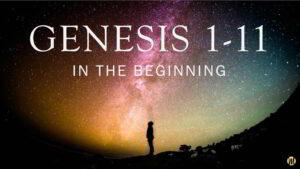 Genesis 1–11: God’s Design for Humanity. Pt. 1/5
Genesis 1–11: God’s Design for Humanity. Pt. 1/5
Faith Seeking Understanding, Intellectual Witness and Spiritual Renewal
 Genesis 1–11: God’s Design for Humanity. Pt. 1/5
Genesis 1–11: God’s Design for Humanity. Pt. 1/5
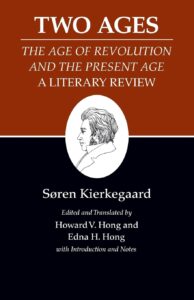 A “repetition” of the ancient path with Soren Kierkegaard.1For Kierkegaard true repetition goes beyond simply repeating acts in conformity to social expectations. He rejects inauthentic existence where one simply conforms to social expectations. Repetition is a philosophical and existential act of renewing everything that one had in order to gain a deeper understanding and appreciation of one’s personal life and relationships. It seeks to reassess one’s life commitment and intentionally takes personal responsibility for choices made in order to create a new, authentic self
A “repetition” of the ancient path with Soren Kierkegaard.1For Kierkegaard true repetition goes beyond simply repeating acts in conformity to social expectations. He rejects inauthentic existence where one simply conforms to social expectations. Repetition is a philosophical and existential act of renewing everything that one had in order to gain a deeper understanding and appreciation of one’s personal life and relationships. It seeks to reassess one’s life commitment and intentionally takes personal responsibility for choices made in order to create a new, authentic self
Reimagining Church and Christian Faith: A Kierkegaardian Critique
The contemporary call to “reimagine church and Christian faith” is often presented as a bold attempt to jettison outmoded church beliefs and practices in order to initiate a creative response to new cultural realities. However, we are mindful of cultural analysts who note with irony that youths who rebel against the social conventions of their parents end up wearing the same clothing fashions, listening to the same pop music and repeating the same platitudes to express support for diversity and social justice. In reality, these youths are merely exchanging one form of social conformity to another in the name of creativity.
It is ironic that churches also conform to the latest religious fashion in the name of “reimagining church and Christian faith”. 2Several prevailing characteristics of the contemporary “reimagine church and faith” movement (following its predecessor, the Emergent Church Movement) include the following: 1) A culture of experimentation and innovation to create seeker-sensitive services. 2) Use of multi-media and bands which incorporate contemporary music styles and art to attract a new generation of youth growing up in a culture of musical performance and entertainment. 3) Relevant messaging where practical advice and personal faith stories replace “mystifying” spiritual and doctrinal teachings of the traditional church. 4) Inclusive approach to Christian faith without demands for adherence to a set of clear-cut theological doctrines.
While these adaptations in church structure and faith practices to engage contemporary culture are not inherently problematic, the concern arises when these innovative external expressions of seeker-sensitive services have in practice inadvertently diminished the timeless truths of the gospel and supplanted inward spiritual passion and obedient discipleship. This dynamic raises important questions about the extent to which these shifts reshape the church’s spiritual identity and doctrinal continuity. Søren Kierkegaard (1813–1855) would diagnose this call for innovation as a symptom of a deeper spiritual sickness – the sickness of an age that has lost its inward passionate commitment of faith and its sense of eternity. In such an age, truth is reduced to nothing more than fashionable opinion. For Kierkegaard, when the church thoughtlessly follows the latest fashion, it is simply accommodating itself to “the spirit of the age” (Zeitgeist). It ceased to be the Church of the New Testament. It has become what he calls Christendom – Christianity domesticated and made respectable, a form without inwardness, reflection without obedience. Continue reading “Reimagining Church and Christian Faith: A Kierkegaardian Critique”
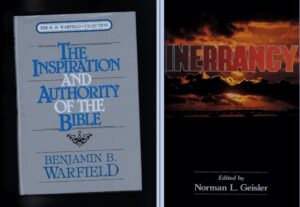 Recommended Books for Defining and Defending Inerrancy. IAB Part 10/10
Recommended Books for Defining and Defending Inerrancy. IAB Part 10/10
J.I Packer, Fundamentalism and the Word of God.
B.B. Warfield, The Inspiration and Authority of the Bible.
Norman Geisler, ed. Inerrancy.
John MacArthur, ed. The Scripture Cannot be Broken.
G.K. Beale, The Erosion of Inerrancy in Evangelicalism.
Gleason Archer, Encyclopaedia of Bible Difficulties
Norman Geisler & Thomas Howe, When Critics Ask.
D.A. Carson, The Enduring Authority of the Christian Scriptures
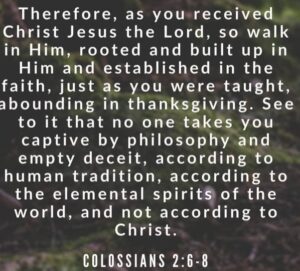
A. Missional Context
To spark interest in the recently published book, Christianity Reimagined, the following provocative questions were posed: What if you could rediscover the heart of Christianity’s spirituality – profound meaning, genuine connection, and a sense of the transcendent – without forcing yourself to accept a single belief that you just can’t? What if Christianity was never meant to be about rigid doctrines or blind belief, but about deep, transformative experiences – the kind you’ve had, the kind that truly shapes a life? These questions are designed to invite readers into the journey of reimagining Christianity for themselves.
The call to reimagine Church and Christian faith is frequently raised by activists from a spectrum of movements that includes liberation theology, postmodern and deconstructive theology, feminist and postcolonial theology, intercultural-religious dialogue and LGBT-Queer theology. These movements seek to reinterpret and modernize Christianity in order to make it relevant to perceived modern spiritual interests and sensibilities. Therefore, attention is directed toward revising traditional doctrines and church practices that are seen as obstacles to personal authenticity and social inclusivity.
The call to reimagine the Church and Christian faith is grounded in the belief that truth claims are inherently relative and must be deconstructed and reconstructed to align with emerging communities and evolving cultural contexts. The aim of this reimagination is to cultivate a faith that resonates with the “lived experience” of spiritual seekers, and to foster a church environment that serves as a “safe space” – a concept that originated within LGBT culture in the United States during the 1970s—for individuals who feel alienated or disillusioned by traditional church structures. Continue reading “Reimagining Church and Christian Faith: An Evangelical Response”
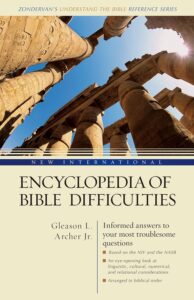 Inerrancy and Alleged Discrepancies of the Bible. Pt.2. KP10-IAB-09
Inerrancy and Alleged Discrepancies of the Bible. Pt.2. KP10-IAB-09
A. Discrepancies due to copyist errors related to numbers due to copyist or scribal error. Examples: 1) Did David capture 1,700 of King Zobah’s horsemen (2 Samuel 8:4), or was it 7,000 (1 Chronicles 18:4)? 2) In 1 Sam 13:5, how were there 30,000 chariots and only 6,000 charioteers? 3) 1 Kings 4:26 – How can this verse say Solomon had 40,000 stalls when 2 Chronicles 9:25 says he had only 4,000 stalls? 4) David’s famine was seven years (2 Sam. 24:13) or three years (1 Chron. 21:12)?
B. Alleged discrepancies arising from incomplete but complementary accounts: Did Judas die by hanging himself (Matthew 27:5) or by falling headlong and bursting open with all his bowels gushing out (Acts 1:18)?
C. Proper perspective on archaeological data and alleged discrepancies (Edwin Yamauchi).
D. Lessons
1) Proper interpretation is crucial in the affirmation of inerrancy:2) Scripture is its best interpreter in canonical context. Scripture priority over fragmentary historical data.3) Inerrancy not naïve or simplistic but highly nuanced Biblical exegesis and hermeneutics must also be highly nuanced
You may view the full video at:
Inerrancy and Alleged Discrepancies of the Bible. Pt.2.
 I. Doubts About the Authenticity of Paul’s Teachings
I. Doubts About the Authenticity of Paul’s Teachings
A common objection raised by critics of Christianity and Muslim apologists is that the apostle Paul distorted the teachings of Jesus and the apostles of the early Jewish-Christian community by importing ideas from the Greco-Roman mystery religions. These included ideas like a dying and rising god, sacramental meals of communion with patron gods, and salvation through union with a divine figure. The purpose of this paper is to refute the critics with historical and biblical evidence, and demonstrate how Paul’s gospel which was received by revelation in his encounter with the risen Christ on his way to Damascus displays consistencies with the teaching of Jesus and the apostles of the early Church.
A. The Claim of Hellenistic Influence
There are several problems with the critics’ theory that Paul was influenced by Hellenistic religions. Continue reading “Christological Origins of Paul’s Gospel”
 Inerrancy and Alleged Discrepancies of the Bible. Pt.1. KP10-IAB-08
Inerrancy and Alleged Discrepancies of the Bible. Pt.1. KP10-IAB-08
A. Present purpose is to address claims of contradiction by laying out the proper framework in dealing with the difficulties and demonstrating with examples why we are justified in calling them “alleged contradictions”.
B. Origins of Discrepancies.
C. Common mistakes in alleging contradictions/ discrepancies .
D. Possibility of harmonization and principles of interpretation. The doctrine of inerrancy does not tell us a priori how we are to interpret individual passages. Rather, inerrancy maintains merely that whatever statements the Bible affirms are fully truthful when they are correctly interpreted in terms of their meaning in their cultural setting and the purpose for which they were written.
E. Some examples of alleged contradiction discussed and resolved – 1) Jesus cleansing of the temple, 2) Ordination of the disciples, 3) Temptations of Jesus, 4) Genealogies of Jesus, 5) Timing of Jesus cursing the fig tree and 6) Jesus sat on two or one donkey in the Triumphal entry, 6) date of Quirinius governorship etc.
You can watch the video at
Inerrancy and Alleged Discrepancies of the Bible. Pt.1. KP10-IAB-08
New video from N.T. Wright
What if the Reformers had Emphasized Ephesians Instead? What the Reformers Missed about Justification: –
Will NT Wright go to heaven? Given all his polemics against the idea of saved souls going to heaven, I will certainly rejoice with the angels in heaven upon hearing an affirmative answer from NTW. Furthermore, given NTW’s rejection of soul-body dualism (of which there are various forms), it would be most enlightening to know how NTW would describe the nature of his existence in heaven (however defined by NTW).
The title of the video should have been – “What NT Wright missed about justification, the soul being forgiven and received into presence of God.” Continue reading “Will N.T. Wright Go to Heaven?”
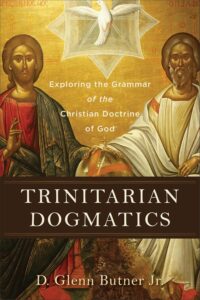
In my previous post, Salvation is Grounded in the Trinitarian Covenant of Redemption, I described how the plan of salvation which began with the “Father’s will” was then accepted for completion by the Son and fulfilled by the operation of the Holy Spirit raises a challenging question.1It should be noted the sequence is logical rather than temporal. “Given that any covenant is premised on a plurality of participants, doesn’t the theology of Covenant of Redemption” lead to the questionable doctrine of social trinitarianism or worse, the heresy of tritheism?” Continue reading “The Covenant of Redemption Does Not Entail Social Trinitarianism or Tritheism”
 Fundamental Argument of Inerrancy as a Necessary Consequence of Inspiration. KP10-IAB-07
Fundamental Argument of Inerrancy as a Necessary Consequence of Inspiration. KP10-IAB-07
A. The Fundamental Argument of Inerrancy
(1) Whatever the Bible affirms, God affirms.
(2) Whatever God affirms is true.
(3) Therefore, whatever the Bible affirms is true.
Inerrancy is a necessary deduction from the Bible’s teaching concerning its inspiration.
OT requirements for God’s prophets to be distinguished from false prophets is premised on absolute truthfulness. The Bible teaches its own authority, and this requires inerrancy. Matt. 5:17 – 20 and John 10: 34 – 35. Inerrancy follows from what the Bible says about God’s character.
B. Limited inerrancy which seeks to replace inerrancy with infallibility is rejected
E. J. Young explains that ‘inerrancy’ meant the Bible does not err, and “infallibility” meant the Bible cannot err. Both are inseparable. Indeed, infallibility is an even stronger affirmation than inerrancy.
“E. J. Young explains that ‘inerrancy’ meant the Bible does not err, and “infallibility” meant the Bible cannot err. Both are inseparable. Indeed, infallibility is an even stronger affirmation than inerrancy.”
CBSI Article XI emphasizes: The two terms are, in context, inextricable. In short, inerrancy and infallibility affirm that the whole of Scripture is true and not only parts of it.
The focus of inerrancy is not limited to issues of factual accuracy in Scripture. It is primarily concerned about the authority of Scripture
C. Consequences of Denial of Inspiration and Inerrancy
Once an interpreter of Scripture begins to use human standards of moral judgment to evaluate the truth status and authority of the Bible, in whole or in part, the authority of the Bible is immediately denied. The real standard of judgment is now to be human moral reason and sensitivity…The abandonment of inerrancy renders every biblical text suspect until it passes or fails some test of human reason (Albert Mohler).
You can watch the full video at:
Fundamental Argument of Inerrancy as a Necessary Consequence of Inspiration. KP10-IAB-07